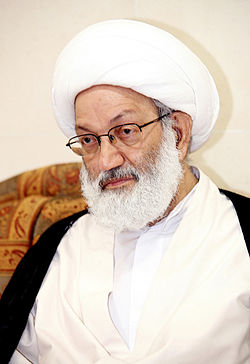 Sheikh Qassim Sheikh Qassim The commander in chief of the Bahrain Defence Force, Shaikh Al-Khalifa, met with the Chief of the UK Defence Forces General Sir Nicholas Houghton. The visit comes just as the UN human rights group has condemned the Bahrain government move to strip Shia cleric Sheikh Isa Qassim of his citizenship. The visit took place less than a day after Bahrain took the controversial action. Last Monday, the UN body said that the move was "clearly unjustified". Bahrain is ruled by a monarchy consisting of Sunnis even though the majority in Bahrain are Shia. Human rights campaigners claim that the meeting gives Bahrain a "green light" to continue repression of dissent in the kingdom. Protests in the capital have been banned for some time. In diplomatic circles there has been increasing criticism of Bahraini suppression of dissent. Iran, which supports the Shia opposition criticized the removal of Qassim's citizenship. Iranian general, Qassem Suleimani, who heads the elite Revolutionary Guard's overseas arm said that the move would create armed rebellion. It could also create fears that UK interests in the region could be under threat. A spokesperson for the UN Human Rights Office, Ravina Shamdasani said the move was against international law: “Given that due process was not followed, it cannot be justified.” She admitted that under international law citizenship could be revoked, but the act must serve a legitimate purpose, and be proportionate to the interests protected and there must be some recourse to appeal. Shamdassani went on: “Given the numbers that we're talking about in Bahrain, we're talking a minimum of 250 people who have been deprived of their nationality, but there are some estimates that go much higher than that. Given that, it is clearly unjustified.We are very concerned at this intensified crackdown on the freedoms of expression and association and the right to a nationality. We urge the Bahraini authorities to seek to de-escalate the situation – instead of taking such damaging steps in quick succession with a serious risk of escalating the situation." The US, a close ally of Bahrain, was critical of the decision. John Kirby, the State Department Spokesperson, said that they were alarmed by the decision saying: “We remain deeply troubled by the government of Bahrain's practice of withdrawing the nationality of its citizens arbitrarily.” The headquarters of the US Fifth Fleet are in Bahrain. The Bahrain Institute for Rights and Democracy (BIRD) claimed that the Bahrain move would escalate tensions and could lead to violence. Human Rights Watch also expressed concern complaining that the country was now in its darkest days since the protests against the monarchy were repressed in 2011. Sayed Alwadeai, director of advocacy for BIRD said: “Bahrain's ally the UK did not even postpone a meeting on military cooperation, let alone issue a statement on this gross repression of Bahrain's civil society. Britain is giving Bahrain a green light for repression.“ Also, the meeting came on the same day that a court increased the time in jail for Nabeel Rajab, an activist who was re-arrested on June 13 for "spreading false news and rumors about the internal situation in a bid to discredit Bahran". The meeting also is coming after a deal between Bahrain and the UK that will allow a new UK naval base in the country. UK naval commandos have been training Bahraini security forces in sniping techniques. MP, Tim Farron said: “It’s a sad demonstration of just how little this government cares about human rights when a top UK general visits Bahrain the day the UN has condemned their regime for persecuting religious leaders and crushing political opposition. Britain cannot claim to champion universal rights while pandering to these regimes. It undermines all of the great work done by the Foreign Office and the Department for International Development worldwide." Alan Hogarth, Amnesty International UK head of government affairs said: “Since its shiny new naval base in Bahrain was announced, the UK has apparently been prioritising its military ties rather than rocking the boat over the Bahrain’s increasingly dismal human rights record. With ongoing arrests, a long-running crackdown on protests, frequent reports of torture in custody and a host of prisoners of conscience now behind bars, the situation in Bahrain gets worse by the week." Hogarth said that the UK should completely revamp its relationship with Bahrain and should be speaking out publicly about violations of human rights in Bahrain. Yet Nicholas McGeehan, a researcher at Human Rights Watch said: "I don’t think any credible observer believes the UK is intent on anything other than sticking as close to the Bahrainis and the Saudis and the Emiratis as possible, irrespective of their conduct and the gravity of their rights abuses. The US has been stronger in its criticism, but if it is truly interested in a stable Bahrain, it needs to do and say more to arrest this slide." However, even though the US has strongly criticized Bahrain it has done nothing to stop the repression. There have been other recent repressive moves by Bahrain. On June 14, the authorities suspended Al-Wefaq the main opposition group. Its headquarters were closed, funds seized, and it had to suspend activities. On June 11 prominent human rights activist Zainab al-Khawaja claimed she was forced into exile after being threatened with being re-arrested.
0 Comments
Your comment will be posted after it is approved.
Leave a Reply. |
Like this writer's work please donate:
Ken Hanly
Ken is a retired philosophy professor living in the boondocks of Manitoba, Canada, with his Filipina wife. He enjoys reading the news and writing articles. Politically Ken is on the far left of the political spectrum on many issues.
Archives
November 2016
Categories
All
|
 RSS Feed
RSS Feed

